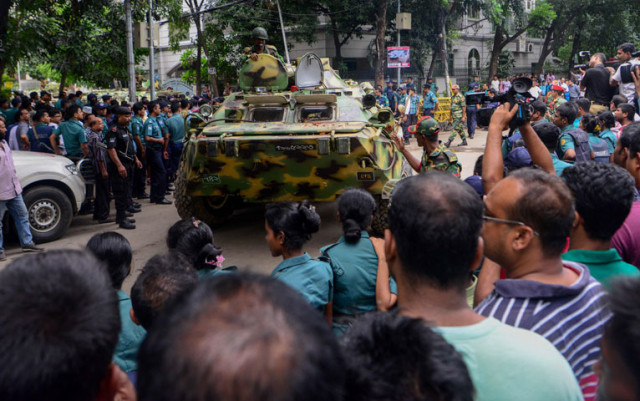Terror proliferates
Both Pakistan and Bangladesh have played softball with extremist elements and IS has moved quietly in the background

A Bangladeshi armoured military tank makes its way past journalists, onlookers and police near an upscale restaurant in Dhaka on July 2, 2016, following a bloody siege by armed attackers that began on July 1. PHOTO: AFP
As noted in these columns previously, the IS has forced a rethink of how terrorism is understood and managed, and although analysts and the commentariat generally have re-swung their compasses, states have been slow to do so, preferring to remain in denial. Both Pakistan and Bangladesh have been unable to move from this outdated position, and both are now as well as in the future going to pay the price of their obduracy. Both states have played softball with extremist elements and the IS has moved quietly in the background, having been ceded space by virtue of the denial of their existence as an operational entity in either. With both states facing a common threat, albeit with localised manifestations, there may be an opportunity to pool both resources and experience — admittedly a move fraught with political hazards — to address what is an emerging sub-continental problem. It is probably a mere matter of time before there is an event in India that will be claimed by the IS and the chain will be complete.
The recent attacks in Bangladesh display considerable complexity, involving several participants and a range of weapons and devices. This is indicative of a mature terrorist infrastructure that did not spring up overnight. The IS does not open offices to gain recruits, it is far more subtle and nuanced than that, occupying instead hearts and minds rather than territory. A new threat demands a new mindset to counter it, and the window of opportunity to create that is closing by the day.
Published in The Express Tribune, July 10th, 2016.
Like Opinion & Editorial on Facebook, follow @ETOpEd on Twitter to receive all updates on all our daily pieces.














COMMENTS
Comments are moderated and generally will be posted if they are on-topic and not abusive.
For more information, please see our Comments FAQ